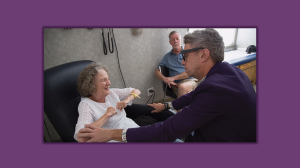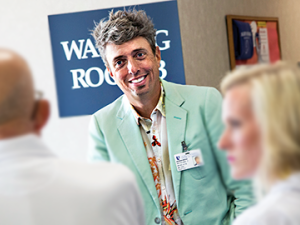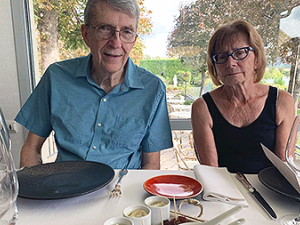Taking a Giant Leap
When facing an illness such as ALS, one in which there currently is no proven treatment to stop or reverse it, patients often look to clinical trials for options for living longer and better lives.
But it can take drug companies years to get clinical trials up and running. And considering federal agencies often require researchers to gather a fair amount of pilot data before awarding grants, acquiring the necessary funding for trials and getting results can take years as well. This is precious time that ALS patients, who on average are given three years to live, do not have.
That’s where private philanthropy can have a substantial impact. With private philanthropy, physician-scientists like Richard Bedlack, MD, PhD, can start trials that federal agencies may view as risky but have the potential to make a meaningful difference in the lives of ALS patients.
“If you want to take a giant leap and see if you can actually do something that’s never happened before, which is to reverse ALS and use a design that’s very unusual, you probably have to use your own money to get that funded,” says Bedlack, director of the Duke ALS Clinic.
A Family’s Support
He says a new trial that holds great promise is happening today solely because of private support. Bedlack credits the Capel family with allowing him to start a trial to test the effectiveness of the asthma drug clenbuterol on people with ALS.
Jeff Capel III, former associate head coach for Duke men’s basketball and current head coach of the University of Pittsburgh, and his family partnered with the Duke ALS Clinic to establish a research fund in honor of his father in 2017. The Jeff Capel Jr. ALS Research Fund raises money to support research efforts at Duke with the ultimate goal of finding a cure. Jeff Capel Jr. was diagnosed with ALS in 2016, and unfortunately, he passed away in 2017.
Bedlack was able to employ the generous gifts from the Capel family, their friends, and colleagues to fully support and launch the clenbuterol trial in February 2020.
Clenbuterol hasn’t been approved by the FDA for use in the U.S.; however, it is used to treat people with asthma in other countries. The drug has been banned for use by athletes in the U.S. because it has been shown to stimulate a growth factor in muscle, which causes muscles to synthesize more protein.
“Muscles become bigger, and in some cases stronger.” Bedlack explains. “That’s cheating in sports, but that’s exactly what we want to happen to our patients with ALS. We want their muscles to get bigger and stronger.”
A previous study using a mouse model of ALS showed that clenbuterol improved muscle strength. Another study of 16 ALS patients in Italy showed that after taking the medication for six months, patients had significant improvement in arm, leg, and breathing strength.
“To my knowledge, that’s never happened in any ALS trial before,” Bedlack says. “Usually we’re excited if the rate of decline on a drug is a little slower than we would expect, but to actually see improvements in strength and breathing measurements over six months in a group of people with ALS is really extraordinary.”
A New Clinical Trial
Bedlack and his team are collaborating with a team headed by Dwight Koeberl, MD, PhD, from the Department of Pediatrics. The researchers are repeating the Italian study and hope to have similar results. They plan to enroll 25 patients with ALS. Every patient will receive the drug; no one will receive a placebo. The patients will take the drug twice a day for six months. Bedlack and his team will measure patients’ breathing, muscle strength, and other factors.
A total of 10 patients were enrolled in the study within the first five weeks, but due to COVID-19 restrictions, the researchers have since had to stop enrollment. Bedlack says they won’t get results of the study as quickly as they had hoped now that enrollment has stopped, but he is hopeful the study could lead to a meaningful treatment option for patients.
“This would have a huge impact if we can replicate that Italian study and show that this drug can actually give people back some of the strength that they’ve lost,” Bedlack says. “This could be significant in terms of drugs that people with ALS use in the future.”
Bill Ott of Chapel Hill, North Carolina, is enrolled in the clenbuterol trial. He hasn’t noticed any improvements yet, but he remains encouraged. Since being diagnosed with ALS in August 2018, he has set several goals for himself. Initially, he hoped to still have the ability to walk by the end of 2019 and to travel to France, San Diego, and Asheville with his wife. Now that he has reached those goals and is in the clinical trial, he says he is determined to still be walking this summer.
“The hope is that I see an improvement in muscle mass, especially in my legs,” Ott says. “I’m hoping the drug gives me the ability to cross the finish line.”
Even if clenbuterol doesn’t help him, Ott says he feels good knowing that his participation in the trial could help others one day. “Anything that proves or disproves any potential solution helps narrow the field,” he says. “Obviously, I’m hoping it works, but even if it doesn’t work, it’s still helping the cause.”
Ott and his wife, Ginny, are furthering the cause by investing their own resources as well. The couple demonstrated their support for others impacted by ALS and the type of research conducted by Bedlack by making a gift to the Duke’s ALS research fund. This unrestricted fund gives Bedlack the flexibility to direct resources to research areas of greatest need. Ott says it was the team approach of his providers at the Duke ALS Clinic that motivated him to give. “The clinic is run as a team sport,” he says. “Every time I go in, I see six different specialists that are experts in a specific area. And every time I go in, I learn something new.”
The Power of Patient Partnerships
Bedlack says this isn’t his first time designing what he describes as patient-centric trials, meaning the trials are easy to get into, involve no placebos, offers answers quickly, and are funded by patients. Prior to the clenbuterol trial, Bedlack was able to study lunasin, a peptide found in soybeans, thanks to a gift from a patient. Lunasin had never been studied on ALS patients before.
“Patients want to help, and some are in the position to be able to do a lot,” Bedlack says. “I think it’s a great partnership. The reason these trials look so different from your traditional pharma-sponsored trial is because they’ve been designed with patient input.”
He says the Capel family’s funding of the clenbuterol trial will play a major role in his team’s ability to make significant strides in ALS research.
“They have allowed us to take a giant leap forward and to look for a signal that’s larger than any signal that’s ever been seen in an ALS trial before—for people to actually get better than they were when they started the study,” he says. “That’s what we’re hoping to see.”





